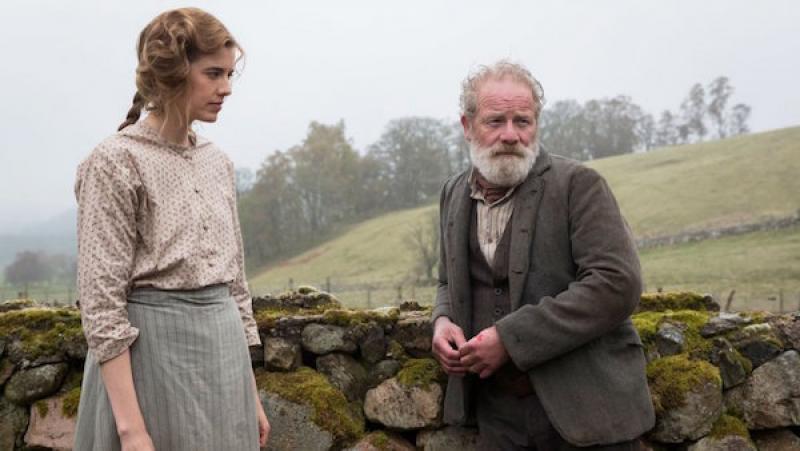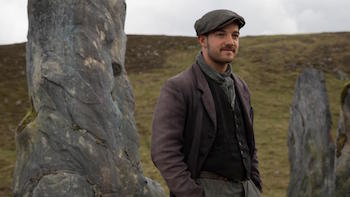DVD: Sunset Song | reviews, news & interviews
DVD: Sunset Song
DVD: Sunset Song
The harsh times of a land-loving Scottish farmer's daughter in the 1910s

Terence Davies’s Sunset Song, adapted by him from the first part of Lewis Grassic Gibbon’s Hardyesque A Scots Quair Trilogy (1932-34), is a farming family tragedy that morphs into the story of the young heroine’s doomed marriage during World War I. Lambently photographed by Michael McDonough, it succeeds as a paean to the spiritual tug exerted on Chris Guthrie (Agyness Deyn) by the landscape of the Mearns in north-east Scotland.
Like his masterful Distant Voices, Still Lives (1988), it evokes its protagonist’s ambivalent nostalgia for a past terrorised by a brutal father. Strict Presbyterian John Guthrie (Peter Mullan, too obvious casting here) thrashes Chris’s brother Will for the merest infraction and forces sex on his worn-out wife. She kills herself and her newborn twins after she becomes pregnant with what would have been her seventh child.
 Will having fled with his bride, Chris relinquishes her promising academic career to run the farm after John is felled by a stroke. Davies mutes the bedridden John’s incestuous longing for Chris; similarly, he eliminates the sexual tension between her and the pacifist miller Chae Strachan and the socialist tenant farmer Long Rob. The ploughman Ewan Tavendale (Kevin Guthrie, pictured above) captures her heart and, as young marrieds, they enjoy a brief idyll before he enlists in the army. Gibbon’s interest in Chris’s sexuality is voyeuristic; Davies honours it as a natural flourishing.
Will having fled with his bride, Chris relinquishes her promising academic career to run the farm after John is felled by a stroke. Davies mutes the bedridden John’s incestuous longing for Chris; similarly, he eliminates the sexual tension between her and the pacifist miller Chae Strachan and the socialist tenant farmer Long Rob. The ploughman Ewan Tavendale (Kevin Guthrie, pictured above) captures her heart and, as young marrieds, they enjoy a brief idyll before he enlists in the army. Gibbon’s interest in Chris’s sexuality is voyeuristic; Davies honours it as a natural flourishing.
It's a pity there'll be no opportunity for Agyness Deyn to deepen the character
The film’s third act (its ceremonial set pieces more stylistically reminiscent of Davies's previous work than what preceded it) depicts the effect on Chris of Ewan's moral degeneration by his experiences as a whoring squaddie in Lanark, then as a reluctant soidier in France. Davies contrasts the beauty and plenitude of Chris's Blawearie fields before harvesting with the churned mud and denuded skyline of the Western Front.
Abused by Ewan when he was last on leave, Chris is charged with discovering what he feels, or felt, for her. Sunset Song's release just before the centenary of the carnage on the Somme was apt, but the movie's evolution into an anti-war tract impedes that of the woman's story. A requiem shot of a piper, seemingly unironic, constitutes a lapse into touristic imagery. Ex-model Deyn is earnest as Chris; it's a pity there'll be no opportunity for her to deepen the character as Gibbon did in the novel's sequels, Cloud Howe and Grey Granite. Happily, the reader of the e-books of the trilogy contained in the DVD can imagine her grappling with motherhood and survival.
rating
Explore topics
Share this article
The future of Arts Journalism
You can stop theartsdesk.com closing!
We urgently need financing to survive. Our fundraising drive has thus far raised £49,000 but we need to reach £100,000 or we will be forced to close. Please contribute here: https://gofund.me/c3f6033d
And if you can forward this information to anyone who might assist, we’d be grateful.

Subscribe to theartsdesk.com
Thank you for continuing to read our work on theartsdesk.com. For unlimited access to every article in its entirety, including our archive of more than 15,000 pieces, we're asking for £5 per month or £40 per year. We feel it's a very good deal, and hope you do too.
To take a subscription now simply click here.
And if you're looking for that extra gift for a friend or family member, why not treat them to a theartsdesk.com gift subscription?
more Film
 The Mastermind review - another slim but nourishing slice of Americana from Kelly Reichardt
Josh O'Connor is perfect casting as a cocky middle-class American adrift in the 1970s
The Mastermind review - another slim but nourishing slice of Americana from Kelly Reichardt
Josh O'Connor is perfect casting as a cocky middle-class American adrift in the 1970s
 Springsteen: Deliver Me From Nowhere review - the story of the Boss who isn't boss of his own head
A brooding trip on the Bruce Springsteen highway of hard knocks
Springsteen: Deliver Me From Nowhere review - the story of the Boss who isn't boss of his own head
A brooding trip on the Bruce Springsteen highway of hard knocks
 The Perfect Neighbor, Netflix review - Florida found-footage documentary is a harrowing watch
Sundance winner chronicles a death that should have been prevented
The Perfect Neighbor, Netflix review - Florida found-footage documentary is a harrowing watch
Sundance winner chronicles a death that should have been prevented
 Blu-ray: Le Quai des Brumes
Love twinkles in the gloom of Marcel Carné’s fogbound French poetic realist classic
Blu-ray: Le Quai des Brumes
Love twinkles in the gloom of Marcel Carné’s fogbound French poetic realist classic
 Frankenstein review - the Prometheus of the charnel house
Guillermo del Toro is fitfully inspired, but often lost in long-held ambitions
Frankenstein review - the Prometheus of the charnel house
Guillermo del Toro is fitfully inspired, but often lost in long-held ambitions
 London Film Festival 2025 - a Korean masterclass in black comedy and a Camus classic effectively realised
New films from Park Chan-wook, Gianfranco Rosi, François Ozon, Ildikó Enyedi and more
London Film Festival 2025 - a Korean masterclass in black comedy and a Camus classic effectively realised
New films from Park Chan-wook, Gianfranco Rosi, François Ozon, Ildikó Enyedi and more
 After the Hunt review - muddled #MeToo provocation
Julia Roberts excels despite misfiring drama
After the Hunt review - muddled #MeToo provocation
Julia Roberts excels despite misfiring drama
 Ballad of a Small Player review - Colin Farrell's all in as a gambler down on his luck
Conclave director Edward Berger swaps the Vatican for Asia's sin city
Ballad of a Small Player review - Colin Farrell's all in as a gambler down on his luck
Conclave director Edward Berger swaps the Vatican for Asia's sin city
 London Film Festival 2025 - Bradley Cooper channels John Bishop, the Boss goes to Nebraska, and a French pandemic
... not to mention Kristen Stewart's directing debut and a punchy prison drama
London Film Festival 2025 - Bradley Cooper channels John Bishop, the Boss goes to Nebraska, and a French pandemic
... not to mention Kristen Stewart's directing debut and a punchy prison drama
 London Film Festival 2025 - from paranoia in Brazil and Iran, to light relief in New York and Tuscany
'Jay Kelly' disappoints, 'It Was Just an Accident' doesn't
London Film Festival 2025 - from paranoia in Brazil and Iran, to light relief in New York and Tuscany
'Jay Kelly' disappoints, 'It Was Just an Accident' doesn't
 Iron Ladies review - working-class heroines of the Miners' Strike
Documentary salutes the staunch women who fought Thatcher's pit closures
Iron Ladies review - working-class heroines of the Miners' Strike
Documentary salutes the staunch women who fought Thatcher's pit closures
 Blu-ray: The Man in the White Suit
Ealing Studios' prescient black comedy, as sharp as ever
Blu-ray: The Man in the White Suit
Ealing Studios' prescient black comedy, as sharp as ever

Add comment